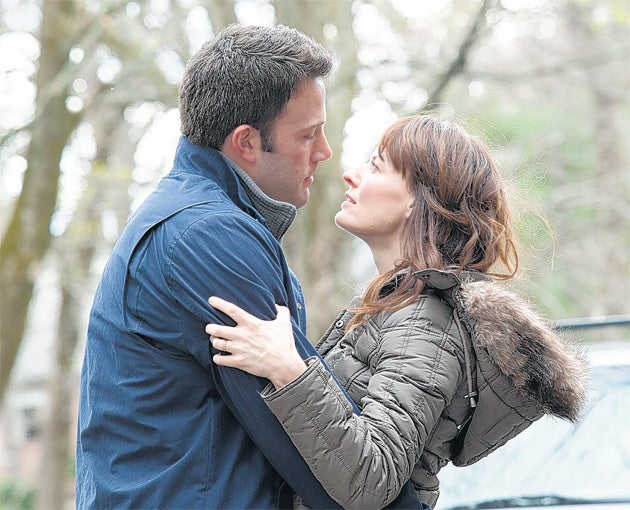The Company Men (15)
Starring: Ben Affleck, Tommy Lee Jones, Maria Bello, Rosemarie DeWitt

We all know people who love their jobs. But what of those people who are their jobs, who have made their identity inseparable from the money and status that work brings? The condition may not be troubling, or even noticeable, during the boom times. In an economic crisis, however, when downsizing is the order of the day, such extreme dependence looks fraught with danger. If you define yourself in terms of your job, then who are you when the job gets taken away?
That question is the beating heart of The Company Men, a drama set in the wake of the financial crash of 2008 and a reminder, as if we needed one, that no job nowadays is for life. Like last year's recession comedy Up in the Air, it places front and centre a handsome alpha male and watches as his luck goes south. Ben Affleck plays Bobby Walker, a golf-mad executive who works for a Boston corporation, GTX, where they're making redundancies in preparation for a big merger. "You're firing me?" he asks, incredulous, and thus his journey of mortification begins. Bobby looks for work, and there's nothing doing. He isn't a natural object of sympathy – how sorry can we feel for somebody who counts Porsche payments among his outgoings? – but he doesn't help himself, either. There's no Clooneyish charm in him, just arrogance, churlishness and a very American sense of entitlement. "I'm not just another asshole with a resume," he says. "You ARE another asshole with a resume" – and that's his wife (Rosemarie DeWitt) talking.
The film is written and directed by John Wells, a debutant in features but with illustrious TV credits to his name, including ER and The West Wing. He presents a chilling picture of corporate US, where loyalty to employees has been ousted by something called the bottom line. "We work for stockholders now," says GTX boss Salinger, much to the disgust of his second-in-command Gene McClary (Tommy Lee Jones) who helped him set up the company years ago when their main resource was shipbuilding. Gene has an old-fashioned sense of business as a community, and objects to the fat cats getting all the cream; he also knows that any display of conscience may put his own position in jeopardy. He is not much more enamoured of a spendthrift wife who talks of golfing weekends in Palm Beach: "Think you can get us one of the corporate jets?" she asks. His silent reaction – Jones does some fantastic looks of despair here – is enough to indicate she'll be flying commercial.
The story's third main character is the most vulnerable economically, and the most pitiable personally. Phil Woodward (Chris Cooper) has worked his way up from the factory floor to the boardroom, and now, pushing 60, finds himself out on his ear. We see him returning to his home and realising that he can no longer afford the life he has made for his family. When he applies to the job placement centre – a humiliation Bobby has already endured – he's told by the adviser that he should dye his hair and not mention his army service in Vietnam: where employment is concerned, age is now his enemy. In one of the film's most resonant lines, he sums up his predicament: "My life ended, and nobody noticed." Gene offers him a sympathetic ear, but he sees too well how Phil, the ultimate company man, has been utterly defeated.
The film, honest and thoughtful as it is, feels a bit short on dramatic poke. Wells's background in TV drama ensures a craftsmanship and attention to detail, but it's not been precisely shaped to feature length. The fault is most discernible in the character of a human resources manager, played by Maria Bello, whose adulterous liaison with Jones's character arrives seemingly out of nowhere. There may have been a problem with the editing, but Bello's role looks to have been muffled, and the story is the weaker for it. Another who could legitimately complain of being downsized is Kevin Costner, playing a minor role as Affleck's blue-collar brother-in-law. Costner is rather good as this lean, close-mouthed fellow, who doesn't especially like Bobby yet out of familial loyalty offers him a carpentry job on his latest house renovation. The symbolism is hammered home – Bobby has to rebuild his life piece by piece – but it establishes a quiet sense of decency to contrast with the Darwinian ruthlessness of the white-collar sector.
As an anatomy of the US under the economic cosh this would make an instructive companion piece to the recent documentary Inside Job. It reveals the human consequences of the government-sponsored deregulation and profiteering that reached its fateful apogee during the Bush years. For the same reason, it is unlikely to set the box-office alight. For some, a drama about joblessness may be too raw; for most, it's not something they'll want to see at the weekend. That's a pity, because they will miss good performances by Affleck, Chris Cooper and Rosemarie DeWitt, and an outstanding one by Tommy Lee Jones. We have perhaps become complacent about this actor's expert embodiment of gnarled integrity. His peerless timing can turn a good line into a great one, and his laconic, side-of-the-mouth delivery creates the striking illusion that he's not really acting at all – that he's firing out the lines by himself, spontaneously. I don't think anyone will mistake The Company Men for a great movie, but it has greatness in it, and goes by the name of Jones.
Join our commenting forum
Join thought-provoking conversations, follow other Independent readers and see their replies
Comments
Bookmark popover
Removed from bookmarks